MND: Northampton mum determined to beat the odds
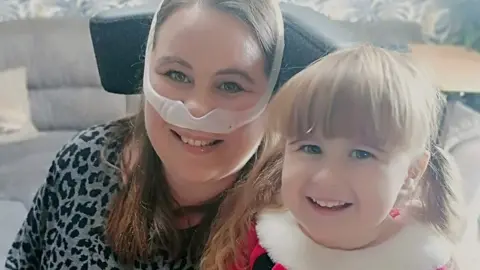 Emma Moss
Emma MossEmma Moss worries people see her and wonder why she had a child. When her four-year-old daughter Veryan was born, Emma had no health problems but she is now in a wheelchair and on life support ventilation due to motor neurone disease (MND).
"Who on earth could look at me now, as I am, and believe that this has changed me so quickly?
"That in the few very short years of Veryan's life I have gone from being perfectly healthy to being profoundly disabled and entirely dependent," she says.
The 41-year-old from Northampton was told she likely had two to five years left to live when she was diagnosed in May 2018, having experienced twitching in her legs and trouble with her grip.
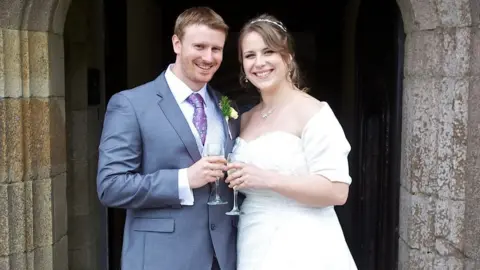 Emma Moss
Emma MossMND takes away a patient's ability to move, to swallow and eventually to breathe. Emma relies on 24/7 ventilation and says she would have died two years ago without it.
"I can't do anything meaningful with my hands, I can't write or dress or wash myself, I can't stand or walk. Three-and-a-half years ago I was working full-time so the change is devastating," she says.
However, the former deputy headteacher says it is absolutely a life worth living. She was so grateful to watch her daughter decorate her Christmas tree again and to be there for her first day at school in September.
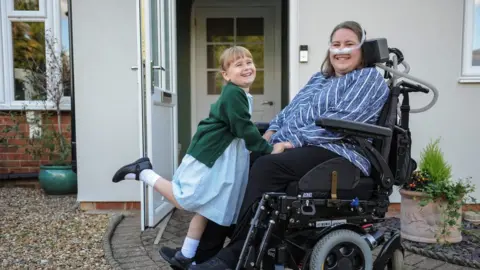 Emma Moss
Emma Moss"I can remember sitting in my neurologist's office being told I had MND when Veryan was 16 months old and it seemed impossible I would ever see her start school, but I did and that was huge for me.
"I really don't take any day for granted. I honestly go to bed every night and my last thought is, 'I hope I wake up'."
There is no treatment and no cure for MND, but scientists believe they are close to finding a way to slow the disease down.
Emma helped campaign for more investment into targeted MND research and went to Downing Street earlier this year. Last month, the government agreed to fund £50m over five years.
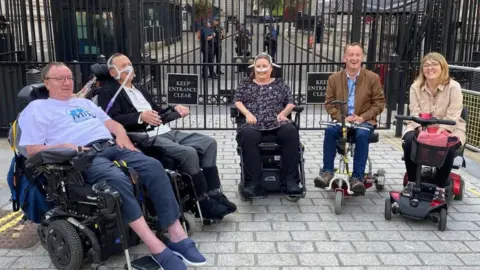 Emma Moss
Emma Moss"The message you get when you are diagnosed is you have two to five years, go and get on with what you have left of your life," she says.
"We wanted to change that message to one of hope and possibility. I am certain this money will bring, if not a cure, at least a treatment that will slow down the disease.
"All I can hope for is just to wake up again, but we need to give people with MND a better option than just hoping for tomorrow."

What is motor neurone disease (MND)?
- MND is a fatal, rapidly-progressing, incurable disease affecting the brain and spinal cord
- There is currently no treatment or cure
- It attacks the nerves that control movement and affects how people walk, talk, eat and breathe
- It kills a third of people within a year and more than half within two years
- About 10% live for 10 years or more
- There is a 1 in 300 risk of getting MND across a lifetime
- It affects up to 5,000 adults in the UK and 200,000 people alive today will be diagnosed with it
- It is not known what causes MND, but genetic, environmental and lifestyle risk factors are thought to contribute

After Emma was diagnosed, she began a Facebook blog, 'Mummy with MND', which has grown to 27,000 followers.
She later started the Facebook support group 'MND Warriors United', which has 1,400 members, most of whom have the disease.
Emma believes there is more awareness now around the illness, compared to when she broke the news to family and friends, who had no idea she was telling them that she was terminally ill.
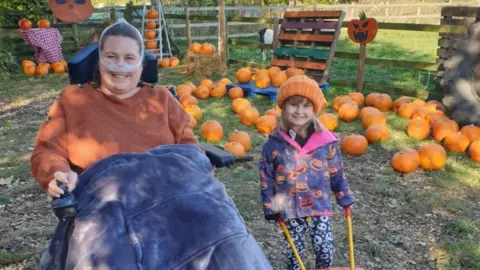 Emma Moss
Emma MossNow she is turning her attention to tracheostomies, where a tube is inserted through the neck and into the windpipe to improve breathing. They are a contentious issue in the MND community.
She wants to start a campaign for patients to have the choice whether to have the intervention, which can prolong their lives.
"People often have to really battle to even have a fair conversation about it, some consultants just refuse," she says.
"It doesn't work in all cases and isn't for everyone. There are lots of implications. Care is more complex, your cost of care will rise and you need to consider whether family life can cope."
Sally Hughes, assistant director of care at the Motor Neurone Disease Association, agrees that the decision on whether to have a tracheostomy is "very much an individual one for the person" and it "should be based on their personal circumstances".
"That will include considering the progression of their MND, their quality of life and the care available to them," she adds.
Allow Facebook content?
For Emma, it is an easy decision and one she hopes her medical team will support when the time comes.
"I intend to choose life whenever I can, if it will allow me to spend more time with my daughter," she says.
She really wants to be here for Veryan's fifth birthday at the end of January, which she says "will seem like a huge milestone".
"As Veryan gets older, it occurs to me there is a real chance she will have real living memories of me," she says.
"I'm just really hoping that I will be alive with her long enough so she has that memory of my voice, and our cuddles and things we did and places we went to, because I know that will be really important to her in the future."
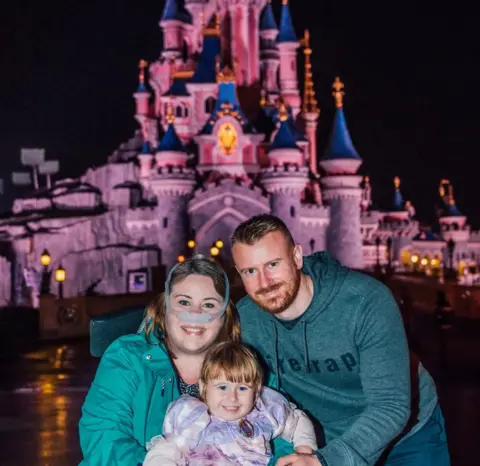 Emma Moss
Emma MossEmma says she would also love for them to be able to go on a family holiday next year. She recently wrote on her blog, though, that she feels very fortunate to just experience simple pleasures, like wintery walks and trips to the park.
"Many of my friends have died and missed out on so much," she wrote. "Sometimes I feel guilty. Sometimes I feel lucky. Sometimes I lay in bed and try to recite all of their names to prove that they are not forgotten. Sometimes the list feels impossibly long.
"I'm beating the odds and I will not stop. I will always be with you, my girl."

Find BBC News: East of England on Facebook, Instagram and Twitter. If you have a story suggestion email [email protected]
